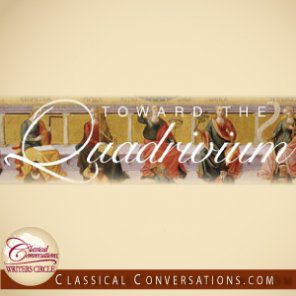When I first started to enjoy reading I was two years removed from my college graduation. My love for reading began initially because I loved music. I began reading about music history, music philosophy, music and worship, and yes, even boring music theory. This pushed me further into studies I never would have expected. I then started reading about philosophy, history, and theology all because of my initial passion for music. My love for one art naturally led me into a love for learning.
Part of human nature is that we pursue that which we are passionate about. Oftentimes, our passions are the source of our sense of meaning in this world. These passions are a result of a love for God’s creation that we cannot help but express. Love is fundamental for the inspiration to pursue our passions; it is how humans learn and grow. Classical Conversations loves cultivating the desire in students to seek out their passions to love learning. It is this love that has been driving us “Toward the Quadrivium” over the past few years. For trivium’s sake, we are pursuing the quadrivium.
The quadrivium continues to remain unknown to western educators. Those who have undertaken the challenge to understand the quadrivium and its historical methods of influence will quickly admit to degrees of ignorance even though they have spent much time researching this ancient educational model. This model has become a lost way of schooling that continues to leave some of the best educational leaders curious to its influence and truth. The quadrivium was part of the classical education model taught in the medieval universities that followed a trivium education. The quadrivium taught the four liberal arts known as the “mathematical sciences”: arithmetic, geometry, harmonics (music), and astronomy. In the medieval period, the seven liberal arts sought to connect the literary arts (trivium) with the mathematical arts (quadrivium). Plato gave the initial outline of these arts in The Republic, but many believe these arts have origins within Egyptian education going back to the time of Moses and the Israelites’ exodus from Egypt.
A liberal arts education that includes the trivium and quadrivium also has ties to Christian education in that it was designed for free people. Plato outlined the liberal arts to be considered as virtues that enabled liberated people to pursue wisdom. This is why a liberal arts education was originally needed to study philosophy and law. Today, we have come to understand freedom in completely individualistic terms. The Apostle Paul gives us a fuller understanding of freedom by giving us a lens through which to see that, because of Christ, we are freed from sin in order to become slaves of righteousness. This idea of freedom is foreign in America. Therefore, we need more tools which help guide students toward an appropriate use of liberty in Christ with ties to responsibility and service toward others. The quadrivium was designed to be a part of this tool.
In his book, Beauty for Truth’s Sake, Stratford Caldecott urges those who are interested in the trivium to also be interested in the quadrivium. He talks about the truth of the trivium to be a necessary means for discovering the beauty of the quadrivium. Historically, the trivium was not taught as an end in and of itself. Instead, the trivium gave tools for effective communication with full intention to move toward the quadrivium and its subjects. And again, the quadrivium also served the purpose of more learning and thus more wisdom. The trivium and quadrivium began and developed within a philosophy of learning in order to embrace education as a life process. This was Plato’s original intent for a liberal arts education.
If properly understood, the trivium is motivated by something far bigger than itself. The leadership at Classical Conversations loves learning and they are motivated by this love. This love drives CC to develop the trivium to be better and better each year and continues to employ others to seek more learning. Classical Conversations wants to rediscover this once-lost quadrivium education in order to give parents and students the tools for more learning and wisdom. The following quote is by Francis Schaeffer and is a wonderful summary of what Classical Conversations believes the trivium and quadrivium can achieve:
Isolating the student from large sections of human knowledge is not the basis of a Christian education. Rather it is giving him or her the framework for total truth, rooted in the Creator’s existence and in the Bible’s teaching, so that in each step of the formal learning process the student will understand what is true and what is false and why it is true or false. It is not isolating students from human knowledge. …It is giving the tools in the opening the doors to all human knowledge, in the Christian framework so they will know what is truth and what is untruth, so they can keep learning as long as they live, and they can enjoy, they can really enjoy, the whole wrestling through field after field of knowledge. That is what an educated person is. (Francis Schaeffer, speech entitled “Priorities” at the L’Abri seminars in 1982.)
Like Plato and the Apostle Paul, we desire education to be embraced as a life process so that our lives will be full of love. We believe the quadrivium is the next step for students to take the reigns and discover for themselves what it means to be in love with life.




